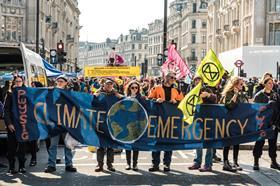Over a third of so-called ‘climate-washing’ claims, which target companies for allegedly misrepresenting their achievements in combating global heating, were launched in 2023 alone. And most actions of this type, seeking to hold polluters to account, are being won by the claimants.
These are among the findings of respected bellwether ‘Global Trends in climate change litigation’, produced by the London School of Economics’ Grantham Research Institute on Climate Change and the Environment.
This year’s snapshot, launched on Thursday, shows that 47 ‘climate-washing’ cases were brought in 2023, bringing the total to more than 140. Over 70% of completed cases have been decided in favour of the claimants.
At least 230 new climate cases were launched last year, reflecting a slower rate of increase than previous years. This ‘may suggest a consolidation and concentration of strategic litigation efforts in areas anticipated to have high impact’, the report says.
However, more than 50 of those 230 cases were not aligned with climate goals but appeared hostile in nature. In this category were cases challenging climate action; ESG backlash cases, challenging the incorporation of climate risk into financial decision-making; and strategic litigation against public participation suits against NGOs and shareholder activists, seeking to deter them from pursuing climate agendas.

The LSE’s dataset is drawn primarily from the New York’s Sabin Center for Climate Change Law’s climate litigation databases. This has logged 2,666 climate litigation cases, 70% of which have been filed since 2015 when the Paris Agreement was adopted.
’Whether climate litigation is advancing or hindering climate action remains difficult to determine,’ said report authors Catherine Higham and Joanna Setzer. ’Some types of case have already had lasting impacts on domestic climate governance.’
The report notes that 'legal associations' such as the Law Society of England and Wales are issuing targeted guidance to help legal organisations align their operations with net zero targets and advising solicitors on how to integrate the physical and legal risks of climate change into their client advisories.
The authors add: 'Lawyers have substantial ethical agency. [Their] ethical responsibilities not only permit but at times necessitate an active and ethically responsible approach towards mitigating environmental harm. The risk of litigation for consulting, advisory and legal services is also increasing. These sectors may confront legal challenges for not adequately considering ‘advised emissions’, ie the emissions associated with the guidance they provide to clients.'
This article is now closed for comment.



























17 Readers' comments